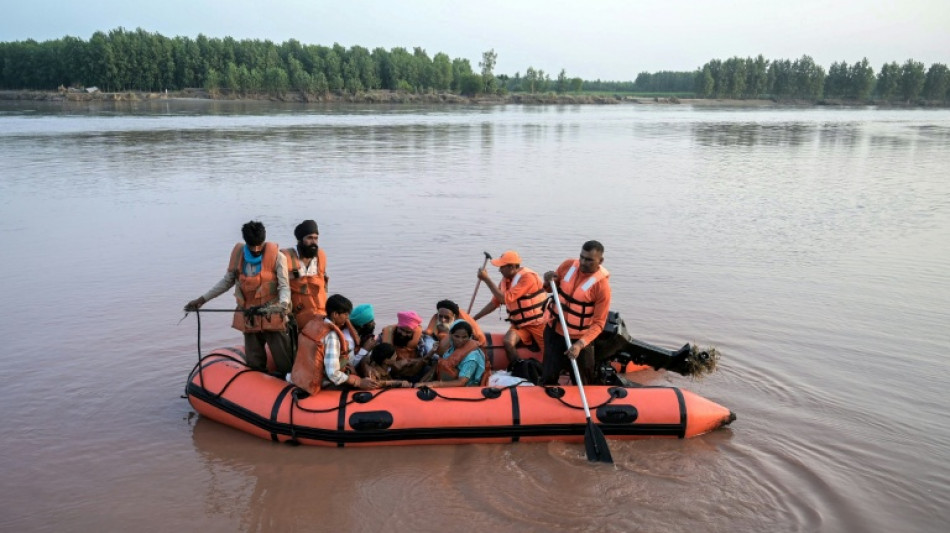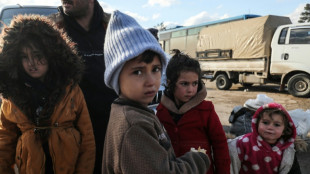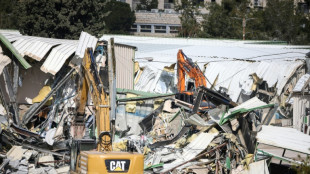
-
 Moscow revels in Trump's Greenland plans but keeps concerns quiet
Moscow revels in Trump's Greenland plans but keeps concerns quiet
-
Global tourism hit new record level in 2025: UN

-
 Senegal poised to party with parade honouring AFCON champs
Senegal poised to party with parade honouring AFCON champs
-
Osaka emerges for Melbourne opener under hat, veil and parasol

-
 Dogsled diplomacy in Greenland proves elusive for US
Dogsled diplomacy in Greenland proves elusive for US
-
Almost half of Kyiv without heat, power, after Russian attack

-
 EU vows 'unflinching' response to Trump's Greenland gambit
EU vows 'unflinching' response to Trump's Greenland gambit
-
Osaka steals show at Australian Open as Sinner strolls through

-
 Brignone impresses in first run of Kronplatz giant slalom in World Cup comeback
Brignone impresses in first run of Kronplatz giant slalom in World Cup comeback
-
Osaka emerges for Melbourne opener under white hat and umbrella

-
 Malawi suffers as US aid cuts cripple healthcare
Malawi suffers as US aid cuts cripple healthcare
-
Bessent says Europe dumping US debt over Greenland would 'defy logic'

-
 Freeze, please! China's winter swimmers take the plunge
Freeze, please! China's winter swimmers take the plunge
-
Talks between Damascus, Kurdish-led forces 'collapse': Kurdish official to AFP

-
 In-form Bencic makes light work of Boulter at Australian Open
In-form Bencic makes light work of Boulter at Australian Open
-
Spain mourns as train disaster toll rises to 41

-
 Sinner into Melbourne round two as opponent retires hurt
Sinner into Melbourne round two as opponent retires hurt
-
Israel begins demolitions at UNRWA headquarters in east Jerusalem

-
 Almost half of Kyiv without heat, power, after Russian attack: govt
Almost half of Kyiv without heat, power, after Russian attack: govt
-
Veteran Monfils exits to standing ovation on Australian Open farewell

-
 Precision-serving former finalist Rybakina powers on in Melbourne
Precision-serving former finalist Rybakina powers on in Melbourne
-
South Korea's women footballers threaten boycott over conditions

-
 Equities sink, gold and silver hit records as Greenland fears mount
Equities sink, gold and silver hit records as Greenland fears mount
-
Australian lawmakers back stricter gun, hate crime laws

-
 EU wants to keep Chinese suppliers out of critical infrastructure
EU wants to keep Chinese suppliers out of critical infrastructure
-
AI reshaping the battle over the narrative of Maduro's US capture

-
 Penguins bring forward breeding season as Antarctica warms: study
Penguins bring forward breeding season as Antarctica warms: study
-
Vietnam leader pledges graft fight as he eyes China-style powers

-
 Ukrainian makes soldier dad's 'dream come true' at Australian Open
Ukrainian makes soldier dad's 'dream come true' at Australian Open
-
'Timid' Keys makes shaky start to Australian Open title defence

-
 Indiana crowned college champions to complete fairytale season
Indiana crowned college champions to complete fairytale season
-
South Koreans go cuckoo for 'Dubai-style' cookies

-
 Harris leads Pistons past Celtics in thriller; Thunder bounce back
Harris leads Pistons past Celtics in thriller; Thunder bounce back
-
Tjen first Indonesian to win at Australian Open in 28 years

-
 Long-delayed decision due on Chinese mega-embassy in London
Long-delayed decision due on Chinese mega-embassy in London
-
Djokovic jokes that he wants slice of Alcaraz's winnings

-
 Trump tariff threat 'poison' for Germany's fragile recovery
Trump tariff threat 'poison' for Germany's fragile recovery
-
Tourists hit record in Japan, despite plunge from China

-
 Jittery Keys opens Melbourne defence as Sinner begins hat-trick quest
Jittery Keys opens Melbourne defence as Sinner begins hat-trick quest
-
The impact of Trump's foreign aid cuts, one year on

-
 Belgian court weighs trial for ex-diplomat over Lumumba killing
Belgian court weighs trial for ex-diplomat over Lumumba killing
-
Inside China's buzzing AI scene year after DeepSeek shock

-
 Asian markets sink, silver hits record as Greenland fears mount
Asian markets sink, silver hits record as Greenland fears mount
-
Shark bites surfer in Australian state's fourth attack in 48 hours

-
 North Korea's Kim sacks vice premier, rails against 'incompetence'
North Korea's Kim sacks vice premier, rails against 'incompetence'
-
Spain mourns as train crash toll rises to 40

-
 'Very nervous' Keys makes shaky start to Australian Open title defence
'Very nervous' Keys makes shaky start to Australian Open title defence
-
Vietnam leader promises graft fight as he eyes China-style powers

-
 Dad-to-be Ruud ready to walk away from Australian Open
Dad-to-be Ruud ready to walk away from Australian Open
-
North Korea's Kim sacks senior official, slams 'incompetence'


Floods devastate India's breadbasket of Punjab
The fields are full but the paddy brown and wilted, and the air thick with the stench of rotting crops and livestock -- the aftermath of record monsoon rains that have devastated India's breadbasket.
In Punjab, often dubbed the country's granary, the damage is unprecedented: floods have swallowed farmlands almost the size of London and New York City combined.
India's agriculture minister said in a recent visit to the state that "the crops have been destroyed and ruined", and Punjab's chief minister called the deluge "one of the worst flood disasters in decades".
Old-timers agree.
"The last time we saw such an all-consuming flood was in 1988," said 70-year-old Balkar Singh in the village of Shehzada, 30 kilometres (19 miles) north of the holy Sikh city of Amritsar.
The gushing waters have reduced Singh's paddy field to marshland and opened ominous cracks in the walls of his house.
Floods and landslides are common during the June-September monsoon season on the subcontinent, but experts say climate change, coupled with poorly planned development, is increasing their frequency, severity and impact.
Punjab saw rainfall surge by almost two-thirds compared with the average rate for August, according to the national weather department, killing at least 52 people and affecting over 400,000.
Prime Minister Narendra Modi has announced a relief package worth around $180 million for Punjab.
- '10 feet high' -
The village of Toor, sandwiched between the Ravi river and Pakistan, is in tatters -- strewn with collapsing crops, livestock carcasses and destroyed homes.
"The water came past midnight on August 26," said farm worker Surjan Lal. "It rose up to at least 10 feet (three metres) in a matter of minutes."
Lal said the village in Punjab's worst-affected Gurdaspur district was marooned for nearly a week.
"We were all on rooftops," he said. "We could do nothing as the water carried away everything from our animals and beds."
In adjacent Lassia, the last Indian village before the frontier, farmer Rakesh Kumar counted his losses.
"In addition to the land I own, I had taken some more on lease this year," said the 37-year-old. "All my investment has just gone down the drain."
To make things worse, Kumar said, the future looked bleak.
He said he feared his fields would not be ready in time to sow wheat, the winter crop of choice in Punjab.
"All the muck has to first dry up and only then can the big machines clear up the silt," he said.
Even at the best of times, bringing heavy earth-movers into the area is a tall order, as a pontoon bridge connecting it to the mainland only operates in the lean months.
For landless labourers like 50-year-old Mandeep Kaur, the uncertainty is even greater.
Her house was washed away by the water, forcing her to sleep in the courtyard under a tarpaulin sheet -- an arrangement fraught with danger as snakes slither all over the damp land.
- Basmati blues -
Punjab is the largest supplier of rice and wheat to India's food security programme, which provides subsidised grain to more than 800 million people.
Analysts say this year's losses are unlikely to threaten domestic supplies thanks to large buffer stocks, but exports of premium basmati rice are expected to suffer.
"The main effect will be on basmati rice production, prices and exports because of lower output in Indian and Pakistan Punjab," said Avinash Kishore of the International Food Policy Research Institute in New Delhi.
Punishing US tariffs have already made Indian basmati less competitive, and the floods risk worsening that squeeze.
The road to recovery for Punjab's embattled farmers, analysts say, will be particularly steep because the state opted out of the federal government's insurance scheme, citing high costs and a low-risk profile because of its robust irrigation network.
Singh, the septuagenarian farmer, said the water on his farm was "still knee-deep".
"I don't know what the future holds for us," he said.
K.Hofmann--VB
